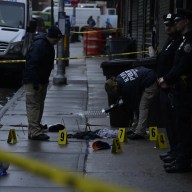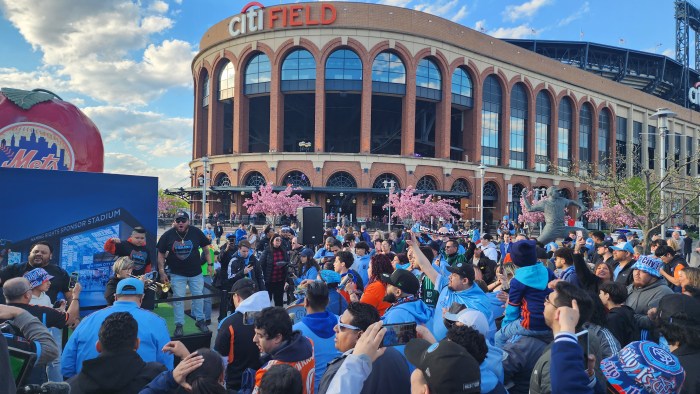By Stephen Witt
Rep. Anthony Weiner began his career as an intern to then-congressman and now U.S. Sen. Charles Schumer. Before becoming a congressman representing parts of Brooklyn and Queens, Weiner served in the City Council. He was born and raised in Park Slope and is a product of the public schools. The following interview took place partly at his office in Washington, D.C., and partly in the nation’s Capitol building between votes. What do you like about running for mayor? Well, I’ve always been animated by the part of my job as councilman and congressman by going out in front of audiences and having a chance to talk to them and hear what they have to stay, and that kind of connection. It’s what gets me jazzed up. There’s no shortage of groups and organizations and political clubs and unions that want to get to meet you and know you and hear what you have to say. I’m like all New Yorkers where I get up in the morning and look around, and think of the fifty things I would do differently if I were in charge. Now I’ve had a chance to actually articulate some of those things and people have commented widely on my articulating them at a furious rate. What are some of the top ideas in your agenda that you would change if elected mayor? I would change the way we would look at the budget for the city of New York. I would always be thinking of ways to do things more efficiently. I came out with a budget proposal about a month ago that laid out a three-tiered plan. One is to give a 10 percent tax cut to all New Yorkers who make less than $150,000 a year, disputing the idea we’re under-taxed as Mike Bloomberg has said. I would argue to New Yorkers that we understand, even if you’re making a living, it’s still hard to make ends meet in New York. I would fund it by doing two things – one, create a new tax bracket for people making more than $1 million a year. Right now the top tax bracket ends at $500,000, so if you’re making $600,000 or $6 million you’re paying the same rate. I would add a different rate of a 5 percent higher tax bracket for those making more than $1 million a year. I would also use a Jack Walsh model, for lack of a better expression, of consistently accessing what’s working and not working in government. I would tell my commissioners twice a year you’ve got to come back to me. Rank everything your agency does by efficiency, by whether it’s succeeding in its goals, and tell me why the bottom five percent of the things you’re doing shouldn’t be reprogrammed or eliminated. So I got that and last week I came out with a rather detailed speech on my plans to reform health care in this city. There are over 1.8 million uninsured New Yorkers and over 950,000 of them are full-time workers. It’s not like these people are poor. A lot of them are just middle-class workers trying to figure out a way to get insured. We need ways to reduce costs to the city by being more efficient with our Medicaid money. How would you provide health insurance to more people? A lot of them are eligible for Medicaid, but the mayor makes the assessment that Medicaid winds up costing the city more so let’s not encourage them and make it more difficult. For example, one of the proposals that I put forth is right now we’re one of the few cities that doesn’t have a completely computerized registration system so it’s paper driven. I would streamline that the way we’ve been talking about in the city for the last six or seven years, but have never done it. You don’t need state help to do that? To streamline the way we would, you absolutely do not. The city in 1999 approached WebMD, an Internet and computer-based healthy care processing system. It’s now six years later and we’re still putzing around trying to figure out a way to get these things done. You don’t need state legislation. You do need state help, really federal help, to come up with some of these pilot programs that I’ve suggested to divert people away from expensive things like hospital care and nursing home care toward less expensive things like nutritional care or inspections of senior citizens apartment to make sure there are no trip hazards and there are places they can hold onto in the bathroom, so the number one cause of hospitalization, broken hips, don’t happen. So give me one more idea that you would put at the top of your agenda if elected mayor? Just about everyone agrees we are at critical mass in terms of traffic and transit congestion in the city. For years I have been leading the charge in Congress for additional ferry funding for the city. If you think about it, we have all these water-borne communities and we are the most backward city when it comes to providing commuter ferry service. We need to provide an integrated ferry system as part of our mass transit infrastructure. I’ve taken the first step. I’ve gotten $15 million in a [federal] transportation bill this year to buy three fast ferries to provide services to places like Rockaway and Bay Ridge. The mayor amazingly has up to now said he’s refusing to put up the 20 percent match from the city, essentially saying no to a $15 million gift. My view is if we’re going to deal with the congestion problem and also improve the quality of life to the outer boroughs, ferry service has to be a part of it. Yet no one talks about it. Everyone says that should be the Port Authority or private industry should do it. I say, ‘No, the mayor should step up and say this is important for our city. That’s another thing I think we aught to do.’ Speaking of the waterfront, in Red Hook the city recently signed a deal to bring in the cruise industry while the last remaining stevedoring operation may be leaving as they are not getting a lease extension… First of all, what’s going on in Red Hook is a classic example of what happens when you don’t provide good planning by the city. During the [Mayor] Lindsey period, when we dumped public housing in Red Hook, we didn’t think through how we were going to provide employment for the people who lived there. The transportation infrastructure is a disaster. You’ve got only one bus line that goes in – the only way to get in and out of Red Hook. So to hark back to my last answer, one of the things we should do is provide ferry service. You can throw a stone to Manhattan from there. It’s a perfect example of where ferry service would work. First off, I support the Ikea coming in. I’m generally a pro development guy. I don’t have this kind of instinctual knee jerk reaction against big projects. I think this one makes some sense. I do think we have to be careful not to completely throw in the towel on all manufacturing and port trade in that part of Brooklyn. Our economy can’t be white rice, all one thing. It has to be more where you have a little bit of everything going on. That’s how you have a vibrant economy. I think eliminating manufacturing or port jobs on the waterfront is a mistake, but that doesn’t mean we’re not going to have 7, 8 or 9 breweries in Brooklyn any more. Those days are gone by, but you should provide space if the Brooklyn Brewery wants to expand and not brew in Utica. That’s one of the challenges of being the mayor, and I think up until now he [Bloomberg] hasn’t really planned, he’s kind of lurched from one proposal to the next. What’s your view on the proposed Atlantic Yards project? Generally supportive. I’d like the process as open as possible and not have condemnation as part of it, but generally I’m supportive of it. It’s basically a moderate rate housing deal and generally speaking, I like those. And you like the Nets coming to Brooklyn? I do. I grew up not far from there. The idea of Brooklyn getting some of this attention, I like. My natural bias is I’m a Brooklyn boy and it’s nice to have Jason Kidd and Carter here. It’s certainly better than having them in New Jersey. That’s for sure. Moving to education, how do you feel about third and fifth-grade testing? It’s a terrible distraction. I don’t have a problem with tests, but if you want to know if your third-grader is reading well, you ask their first-grade teacher. A first-grade teacher worth his or her salt can look around at a first grade class after two months on the job and say this one is going to need more help, that one is going to need more challenge, this one we’re going to have to strap in his seat. That kind of assessment a good teacher does all the time. I think the third grade test kind of distracted us from a more fundamental point and that is we have to be pursuing two things. One, we have to get students even younger than third grade. But two, I ’m very concerned about the student that’s failing, but I’m also very concerned about the average student we want to make a great student and the great student we want to make a Westinghouse Scholar. For many Middle class New York families the challenge of education is not just about whether their kids’ are failing or not. It’s about whether their average kid is getting every asset they can. We sometimes think that its just about making sure a kid can pass, but it’s also about making sure the school system is in place that attracts middle class parents to believe that their kids will get a good education at all levels. While the mayor has recently gotten support of the construction trade union, he has gone his entire administration without negotiating a contract with cops or teachers. How would you handle this situation? I will not do what the mayor has done, which is triangulate against working men and women in the city; how tough he is on teachers; how tough he is on cops and firefighters. There’s no doubt I’m going to stand up from time to time in the Blue Room and try to get my way by persuading to public to be with me by saying we need this concession from the union or we need this change. But I won’t substitute for sitting behind closed doors and respectfully dealing with my teacher constituents and firefighters. I come from a union household. My mother was a teacher for 33 years. I firmly believe that these are just not employees. The mayor sees them in the classic business sense as assets and liabilities. He sees his labor force as a liability that costs them money. I see them also as my constituents so I would handle things differently. You have had some problems in campaign financing and in fact have had to give back some contributions. On the other hand, Mayor Bloomberg has a bottomless pocket. How do you plan to compensate for the disparity in money needed to run successfully for mayor? I’ve always been outspent in my races. Always been the candidate where the political organization supports the other guy and I’ve never lost a race. So I’m not going to outspend Mike Bloomberg, but I’m going to outwork him. I’m going to talk to the issues that people really care about. I’m going to connect with people. That’s how I’ve always won races and that’s how I’m going to win this one. How do you plan to distinguish yourself from the other Democratic candidates? There’ s an old, new divide in this primary, and frankly, there’s a status quo–ism among my opponents, the mayor included. On the other hand, if you want someone who is going to look at things differently, who came from a middle-class Brooklyn background, who is never going to be satisfied with the status quo than I’m your choice. How do you think you would do against Mike Bloomberg in a debate? You know one of the commentators on Channel 7 said this week that I was the candidate that Mike Bloomberg fears the most. He should only be afraid if he’s not prepared to engage in debate about the future of this city. If he wants to argue that everything is fine and that people aren’t generally taxed enough and that middle class New Yorkers shouldn’t get a tax break like I’m proposing, he does have something to be afraid of, because I’m going to engage him in that debate, and I’m also going to do something else that Democrats sometimes don’t do – sometimes Democrats go into knife fights carrying library books. I’m in this race to win it, and I’m going to make him defend his Republican heritage and I’m going to make him defend the decisions of his administration, and I’m going to lay out a vision that shows a different way I take this city Finally, the mayor is against the proposed Cross-Harbor Freight tunnel from New Jersey to Bay Ridge and through Borough Park and Flatbush to Maspeth Queens. What’s you take on the proposed tunnel? I represent Maspeth and I represent some of Flatbush, and you have to solve the problem of trucks barreling through our community, and I’m open to any ideas that would do it. The cross-harbor tunnel is certainly a better idea than the way that we’re doing it now. However, I think the real outrage of this is the way the mayor has flip-flopped on this issue. He’s playing politics with it, I’m trying to say to all of my constituents that we have to figure a way to reduce truck traffic and we’re going to do it in a way that mitigates any adverse impact.
































